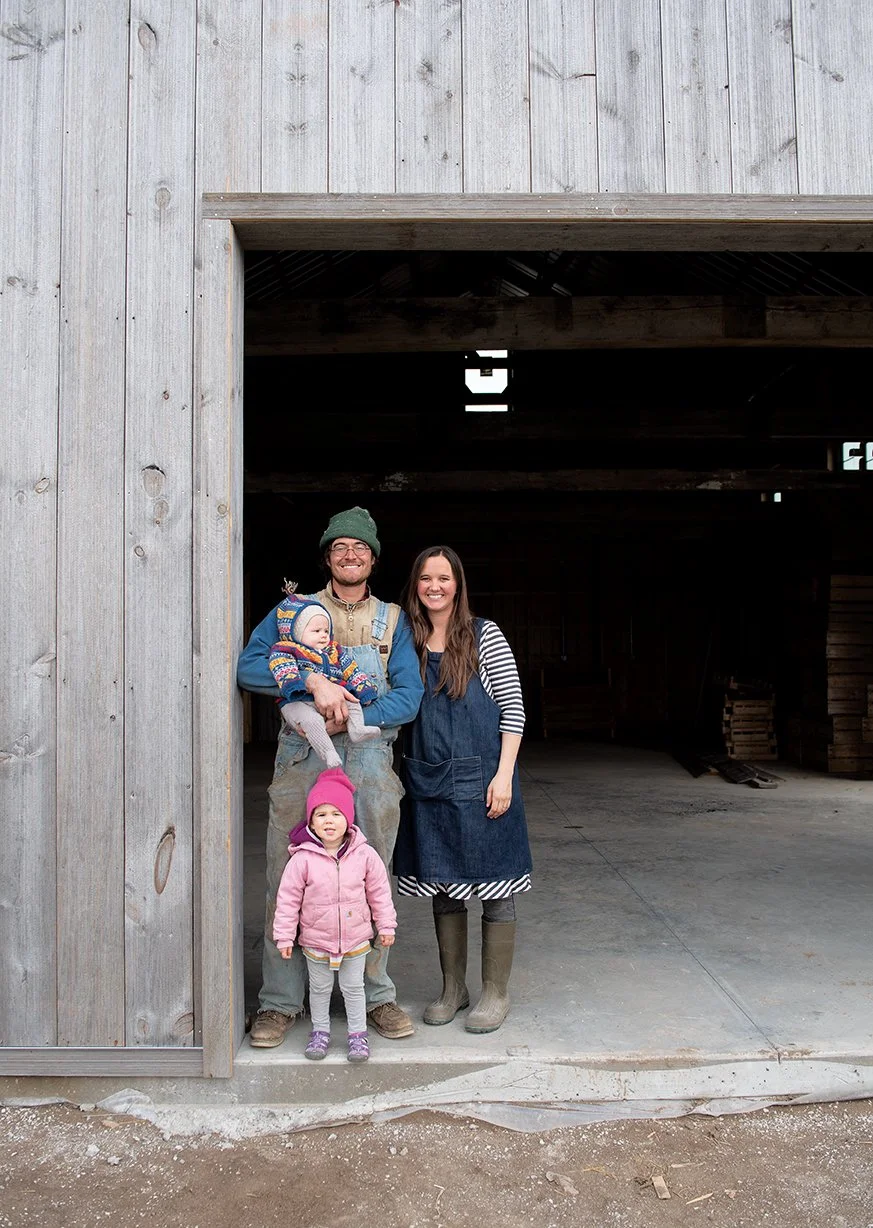Jordan and Whitney Clasen are seen in a barn built on land they purchased near Earlham where they will begin planting produce on their farm, Grade A Gardens, which grows fresh fruits and vegetables they sell as part of a Community Supported Agriculture system, at farmers markets and to local restaurants. Photo by Duane Tinkey
Circle our cities
Sustainable Iowa Land Trust launches campaign to create food farms where they are needed most
By Michael Crumb
Growing food closest to the people who need it most.
That’s the mission of the Sustainable Iowa Land Trust’s new campaign, Circling Our Cities, to find land around Iowa cities that can be transformed into sustainable food farms where fresh produce would be grown closest to cities where they believe it can do the most good. The goal is to circle 10 Iowa cities with 10 food farms in 10 years.
“The origin of Circle Our Cities is to bring home the fact that our metro areas are importing 90% of our food from out of state when we have some of the best soils in the world, and we can use just a fraction of that surrounding our cities to feed the people in them,” said Suzan Erem, executive director of the Sustainable Iowa Land Trust, or SILT.
Citing a study done by Iowa State University, Erem said 200 people per acre per season could get their minimum daily allowance of fruits and vegetables.
SILT was formed specifically to protect land for nature-friendly table food farming. It works to identify and obtain land for the development of small, sustainable farms. It has protected 14 farms on 1,130 acres since 2015, and the Circle Our Cities campaign is the latest step in that effort, Erem said.
Local food farms can play an integral role in the fight against food insecurity, which affects 1 in 11 people in Iowa. Of those, 1 in 8 are children. Overall, nearly 300,000 Iowans are experiencing food insecurity, a problem that saw heightened need during the ongoing coronavirus pandemic, according to data from the Feeding America website.
Business Publications Corp. and its publications -- including the Business Record, dsm Magazine and ia Magazine -- are in their second year of their Iowa Stops Hunger campaign to bring attention to the plight of those who are food insecure, and to shed light on those who have made it their mission to help.
SILT is trying to be part of that solution with its Circle Our Cities campaign, and the organization has hired a “land scout” to reach out to Central Iowa landowners who may be interested in entering into landowner agreements where their land would be preserved for sustainable food farms.
“They will network with folks who work with landowners who are both excited about our vision and our mission of growing food for the future and have the capacity to donate their land, or a portion of their land, or a conservation easement,” Erem said.
That land scout is Kiara Fish, a recent Drake University graduate who has experience as a community organizer.
Fish said her initial focus is areas around Des Moines in Polk and surrounding counties, but the long-term plan is to expand the campaign statewide.
“I think people are really excited about it,” she said. “I think it seems like a really good solution, seeing all the development that is encroaching upon places that used to be farms, and knowing that there needs to be an organization that’s looking to protect farms and create these sustainable food networks for the future.”
Fish said growing food closer to where it is needed only makes sense in addressing food insecurity.
“Keeping foods local and locally produced, it supplies these markets with nutrient-dense, healthy foods,” she said. “We saw how fragile the supply chains were during COVID when stores ran out of food, so fighting food insecurity by creating these nature-friendly farms in close proximity to cities and markets makes sense.”
The farms will also help keep money circulating within local economies, Fish said.
“It’s a win-win situation because we’re protecting farms producing these fresh farm-to-table foods and creating jobs as well,” she said.
SILT plans to offer distribution and marketing support to startup farms, Fish said.
Building a farm from the ground up
One of the farms protected by SILT is Grade A Gardens near Earlham.
Jordan and Whitney Clasen purchased the land at a discount from Bob Winchell, who sought ways to preserve the land as part of settling his wife Thelma’s estate.
The land is adjacent to the Bear Creek Friends Meeting House where the Winchells attended. Thelma Winchell purchased it to prevent it from being developed for residential or commercial use. Bob sought to donate the land through SILT to make his wife’s wishes become a reality.
Jordan Clasen said Grade A Gardens offers a large Community Supported Agriculture network made up of 100 families. A CSA is a production system where people buy shares of a farmer’s harvest in advance and then receive various fresh produce throughout the season.
The Clasens also sell produce at the Downtown Farmers’ Market and sell produce to some of the restaurants in Des Moines.
Clasen and his wife met and became involved in SILT when he was produce manager at Gateway Market. They rented space in Johnston for nine years, and after getting married three years ago decided to begin searching for land to own.
“We probably walked 40 to 50 farms. We kind of had a list of what we wanted in a farm,” said Clasen, who along with his wife has two children, ages 2 years and 5 months. “SILT had given us a lead that this farm we’re on was going to be up for sale. My wife and I drove out here and we knew the second we walked on it that it was the spot. It’s close to town. It’s flat fields. It was just a good spot.”
With 8 acres going into production this year, Clasen plans to grow a range of produce from lettuce and spinach to tomatoes, potatoes, zucchini, squash, sweet potatoes, garlic and apples.
The Clasens paid $115,000 for just under 27 acres. They have now built a house to live in and they did a Kickstarter campaign that raised $150,000 to build a barn.
Justin Clasen sees local food farms as an important element in the fight against food insecurity.
“We crank out quite a bit of food, producing real food that is nutritious, so we feel if they circle our cities with more farms like ours, we could really start feeding people,” he said.
Establishing food farms close to cities also provides an opportunity to educate people on how their food is grown and how it can be prepared, Clasen said.
One way Grade A Gardens does that is by hosting its annual garlic festival on June 5, which is free and open to the public.
“Just that interaction, just talking goes a long way, but you can’t do that if people can’t get to your farm,” Clasen said. “It’s important to be close to town and have that talk.”

